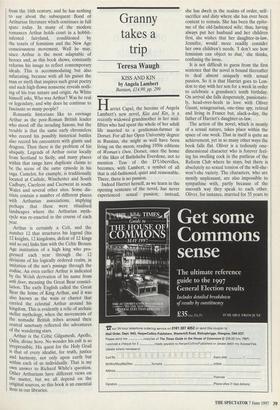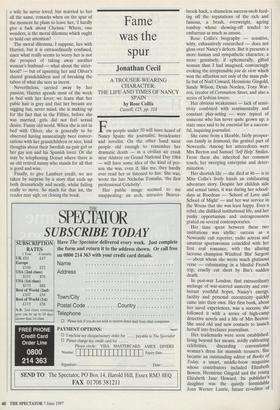Granny takes a trip
Teresa Waugh
KISS AND KIN by Angela Lambert Bantam, £14.99, pp. 299 Harriet Capel, the heroine of Angela Lambert's new novel, Kiss and Kin, is a recently widowed grandmother in her mid- fifties who had spent the whole of her adult life married to a gentleman-farmer in Dorset. For all her Open University degree in Russian, she might as well have been living on the moon, reading 1950s editions of Woman's Own. Dorset, once the home of the likes of Bathsheba Everdene, not to mention Tess of the D'Urbervilles, becomes, with Lambert, a symbol of all that is old-fashioned, quiet and reasonable. There, there is no passion. Indeed Harriet herself, as we learn in the opening sentence of the novel, has never experienced sexual passion; instead, she has dwelt in the realms of order, self- sacrifice and duty where she has ever been content to remain. She has been the epito- me of the old-fashioned wife; thus, having always put her husband and her children first, she wishes that her daughter-in-law, Jennifer, would more readily consider her own children's needs. 'I don't see how feminism can object to that,' she thinks, confusing the issue.
It is not difficult to guess from the first sentence that the novel is bound thereafter to deal almost uniquely with sexual passion. So it is that Harriet goes to Lon- don to stay with her son for a week in order to celebrate a grandson's tenth birthday. On arrival she falls desperately, passionate- ly, head-over-heels in love with Oliver Gaunt, sexagenarian, one-time spy, retired and living in France but, alack-a-day, the father of Harriet's daughter-in-law.
The action of the novel, which is mostly of a sexual nature, takes place within the space of one week. That in itself is quite an achievement, yet in so many other ways the book falls flat. Oliver is a tediously one- dimensional character who is forever feel- ing his swelling cock in the purlieus of the Reform Club where he stays, but there is absolutely no sexual tension of the will-she- won't-she variety. The characters, who are mostly unpleasant, are also impossible to sympathise with, partly because of the uncouth way they speak to each other. Oliver, for instance, married for 35 years to a wife he never loved, but married to her all the same, remarks when on the spur of the moment he plans to leave her, 'I hardly give a fuck about Clarissa.' Where, one wonders, is the moral dilemma which ought to hold our attention?
The moral dilemma, I suppose, lies with Harriet, but it is extraordinarily confused, since what really seems to worry her is not the prospect of taking away another woman's husband — what about the sister- hood? — but of upsetting her and Oliver's shared grandchildren and of breaking the taboo of what she sees as incest.
Nevertheless, carried away by her passion, Harriet spends most of the week in bed with her lover; we learn that her pubic hair is grey and that her breasts are sagging but, never mind, she is making up for the fact that in the Fifties, before she was married, girls did not feel sexual desire. Funny old world. When she is not in bed with Oliver, she is generally to be observed having nauseatingly twee conver- sations with her grandchildren or nice, kind thoughts about their Swedish au-pair girl or her gay son and his Spanish lover. Or she may be telephoning Dorset where there is an old retired nanny who stands for all that is good and wise.
Finally, to give Lambert credit, we are taken by surprise by a story that ends up both dramatically and neatly, whilst failing really to move. So much for that lot, the reader may sigh, on closing the book.











































































 Previous page
Previous page